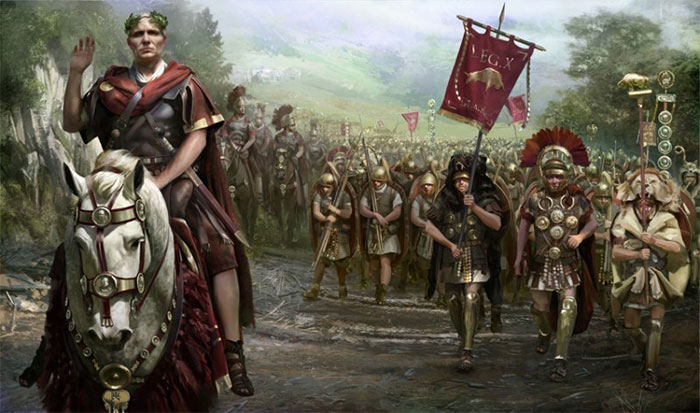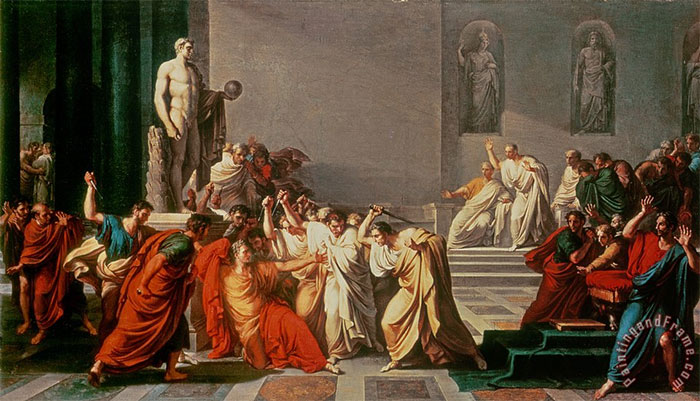Historians recently made a statement on the motive of fully absorbing the power of Roman dictator Gaius Julius Caesar.
According to Express, Gaius Julius Caesar was a dictator, politician, military general who played an important role in the recession of the Roman Republic and the transition to the Roman Empire.
In his military career, Caesar was ranked tied with Alexander the Great, Hannibal, Genghis Khan or Napoleon. Caesar is considered one of the 10 greatest generals in the world.
In 60 BC, Caesar and Marcus Licinius Crassus and Gnaeus Pompey Magnus formed a political coalition that dominated Roman politics for many years.
Caesar became one of the most powerful politicians in the Roman Republic thanks to a number of achievements, most notably victories in the Gallic Wars, 51 BC.
In 50 BC, the Senate, headed by Pompey, who had been his ally, ordered Caesar to dissolve his army and return to Rome. The Senate also banned Caesar from running for office. Faced with this situation, Caesar believed that he would be isolated from political life if he returned to Rome. Pompey also accused Caesar of “disobedience” and “treason”.
Day 10.1. In 49 BC, Caesar crossed the Rubicone River (near the Italian border) with a single army of Roman legionaries (Legio XIII) and started a civil war. Caesar pursued Pompey to the end, hoping to restore allies, but Pompey continued to flee.
 Caesar played an important role when the Roman Republic gradually fell, replaced by the Roman Empire.
Caesar played an important role when the Roman Republic gradually fell, replaced by the Roman Empire.
Ultimately, Caesar destroyed Pompey’s main force in Hispania. After that, Caesar enlarged and attacked Pompey in Greece. Caesar wisely won, although Pompey’s forces were much larger (3 times more infantry and much more infantry).
Returning to Rome after his resounding victory, Caesar became the wielding power and absolute influence in Rome.
After taking control of the government, Caesar went on to gain power, eventually becoming a “dictator for life.”
In the Amazon documentary, historians reveal Caesar’s early ambitions for power. “At the age of 15, Caesar entered the political arena, wearing a toga – the special attire of a Roman citizen. He followed his father to Rome.
Under the republican regime, Rome acquired the Mediterranean, innumerable riches, improved the lives of people. But the political turmoil never ended, ”the documentary said.
Caesar’s father was a member of Congress, working in the government of Rome. Caesar’s life changed when his father died.
Keith Hopkins, a former professor at the University of Cambrigde, UK, has revealed the politics of Rome. “Rome was a system of nobles in which the nobility competed for political office. But the voters are the people ”.

The photo shows the moment when Caesar was assassinated.
“The nobles are constantly competing for power, attracting the military to resolve the conflict,” Hopkins said. “As a result, there have been countless civil wars between political factions.”
Oxford University Professor Averil Cameron explains Caesar’s thirst for victory, the thirst for power. “Caesar was born into a high class family, but they are slowly losing power. It is probably the motivation for Caesar to try to restore the image of the family ”.
“Caesar’s father quickly passed away, leaving him to pursue a career on his own. He has gone to great lengths in his political career and I’m sure there is a huge boost to his ambitions, ”Cameron said.
Professor Andrew Wallace-Hadrill of the University of Cambridge said: “Caesar grew up in a family that needed power to survive civil wars in the political arena. Caesar has pressure, effort and the desire to succeed ”.
In 44 BC, Caesar was assassinated by political opponents led by Gaius Cassius Longinus, Marcus Junius Brutus and Decimus Junius Brutus. He was stabbed 23 times in total. Brave to the end, Caesar said: “It is better to die once than to live continually in fear of death.”
Caesar’s death sparked a new civil war, causing the collapse of the Roman Republic. Caesar’s nephew, Octavian, who was appointed to inherit the estate, holds full power after wiping out his opponents. Octavian also took power, beginning the era of the Roman Empire.


